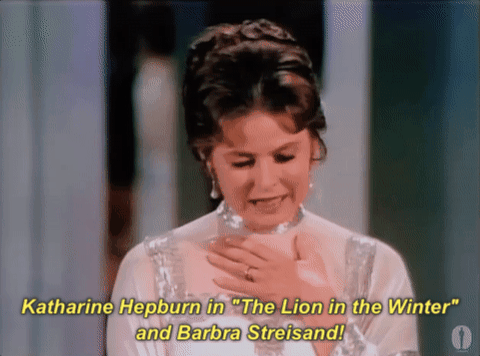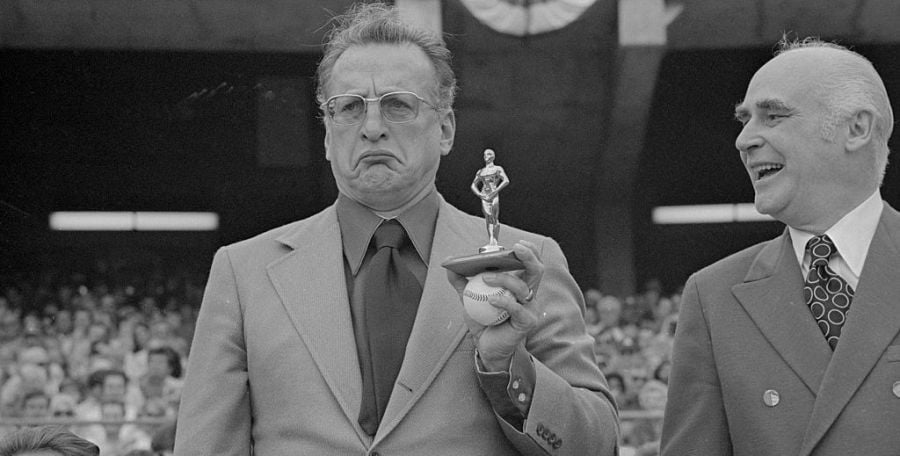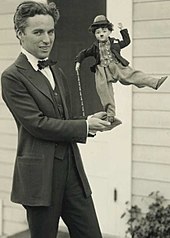|
|
Post by galacticgirrrl on Apr 13, 2023 14:51:55 GMT
Today in HistoryAPRIL 13, 1964 Sidney Poitier becomes the first Black person to win an Oscar for Best Actor for Lilies of the Field. Sidney Poitier becomes the first Black person to win an Oscar for Best Actor for Lilies of the Field.
"I realized that there was a great deal riding on my chances, that a victory on Monday night would mean an enormous amount to a great number of people, and it would be unfair of me to take the edge off it by not appearing" - Sidney Poitier Nominees Best Actor in a Leading Role
Sidney Poitier Homer Smith Lilies of the Field Albert Finney Tom Jones Tom Jones Richard Harris Frank Machin This Sporting Life Rex Harrison Julius Caesar Cleopatra Paul Newman Hud Bannon Hud The only Best Picture Oscar nominee that year to be also nominated for Best Cinematography (black and white). Budget: $250,000 (just under half of what Sidney earned per film at this point in his career) Poitier agreed to star in the film for $50,000 and 10% of the profits. Director Ralph Nelson had to put up his house as collateral. Shot on-location in Arizona in only fourteen days. The film was shot on Linda Ronstadt's father's small ranch. Banned by the South African apartheid censor board. Considered to be one of fifteen films that changed American cinema. Harry Belafonte declined the role believing the film would do nothing to further Civil Rights. Director Cameo by Ralph Nelson as Mr. Ashton. Despite the role being sizable, Nelson did not give himself an onscreen credit for it. Based on the true story of the Sisters of Walburga who started up an American nunnery in Colorado. The film was a surprise critical and box office success. Lilies of the Field is a film completely of its time and that also stands the test of time. It holds up just as well today as it did on its release in October 1963. The messages are universal and timeless: love one another, embrace differences, work together, we are all created equal.
|
|
|
|
Post by Fading Fast on Apr 13, 2023 15:18:14 GMT
Today in HistoryAPRIL 13, 1964 Sidney Poitier becomes the first Black person to win an Oscar for Best Actor for Lilies of the Field. Sidney Poitier becomes the first Black person to win an Oscar for Best Actor for Lilies of the Field.
"I realized that there was a great deal riding on my chances, that a victory on Monday night would mean an enormous amount to a great number of people, and it would be unfair of me to take the edge off it by not appearing" - Sidney Poitier Nominees Best Actor in a Leading Role
Sidney Poitier Homer Smith Lilies of the Field Albert Finney Tom Jones Tom Jones Richard Harris Frank Machin This Sporting Life Rex Harrison Julius Caesar Cleopatra Paul Newman Hud Bannon Hud The only Best Picture Oscar nominee that year to be also nominated for Best Cinematography (black and white). Budget: $250,000 (just under half of what Sidney earned per film at this point in his career) Poitier agreed to star in the film for $50,000 and 10% of the profits. Director Ralph Nelson had to put up his house as collateral. Shot on-location in Arizona in only fourteen days. The film was shot on Linda Ronstadt's father's small ranch. Banned by the South African apartheid censor board. Considered to be one of fifteen films that changed American cinema. Harry Belafonte declined the role believing the film would do nothing to further Civil Rights. Director Cameo by Ralph Nelson as Mr. Ashton. Despite the role being sizable, Nelson did not give himself an onscreen credit for it. Based on the true story of the Sisters of Walburga who started up an American nunnery in Colorado. The film was a surprise critical and box office success. Lilies of the Field is a film completely of its time and that also stands the test of time. It holds up just as well today as it did on its release in October 1963. The messages are universal and timeless: love one another, embrace differences, work together, we are all created equal. |
|
|
|
Post by sepiatone on Apr 13, 2023 15:34:57 GMT
I never tire of seeing this movie. Poitier certainly deserved his statuette, And I feel too, that it had one of Stanley Adams' best performances. Plus, I still laugh out loud when he does his "I have paid my insurance" bit.  Sepiatone |
|
|
|
Post by galacticgirrrl on Apr 14, 2023 1:51:24 GMT
I never tire of seeing this movie. Poitier certainly deserved his statuette I have to admit I let out an audible gasp when I saw the other nominees. Richard Harris in This Sporting Life is one of my favorites of all time. Thankfully these two aren't coming up against each other in the bracket challenge. : D I haven't read the book. Thanks for the suggestions & reviews FF. Interesting to see this: but surprisingly, the movie might be slightly better. That is a pretty rare phenomenon. I might be able to count the instances on one hand. |
|
|
|
Post by Fading Fast on Apr 14, 2023 6:03:49 GMT
I never tire of seeing this movie. Poitier certainly deserved his statuette I have to admit I let out an audible gasp when I saw the other nominees. Richard Harris in This Sporting Life is one of my favorites of all time. Thankfully these two aren't coming up against each other in the bracket challenge. : D I haven't read the book. Thanks for the suggestions & reviews FF. Interesting to see this: but surprisingly, the movie might be slightly better. That is a pretty rare phenomenon. I might be able to count the instances on one hand.
Agreed on the book comment as it is rare when the movie is better, but I think the movie "Lilies of the Field" just nudges out the book. They are both so good, I'm just glad they are out there. In the movie, the scene where Poitier and the Mother go toe to toe with their Bibles is pure movie gold. |
|
|
|
Post by sepiatone on Apr 14, 2023 15:18:24 GMT
I have a short list of movies I thought were better than the books they were based on. A few are----
THE NATURAL(based on Bernard Malamud's book)
FORREST GUMP (book by Winston Groom)
BEING THERE (book by Jerzy Kosinski)
THE SILENT PARTNER (Based on the book "Think Of A Number" by Anders Bodelsen)
SOLDIER IN THE RAIN (book by William Goldman)
And I'm still looking for some books that movies I like were based on, so the list will probably get longer. So a movie being better than the book really isn't all that rare.
Sepiatone
|
|
|
|
Post by dianedebuda on Apr 14, 2023 15:22:18 GMT
Six Days of the Condor (James Grady); movie: Three Days of the Condor (1975)
|
|
|
|
Post by galacticgirrrl on Apr 15, 2023 1:05:13 GMT
APRIL 14, 1969
Katharine Hepburn and Barbra Streisand tie for Best Actress Oscar Both Streisand and Hepburn received 3,030 votes each; it was the first exact tie in a principal Oscar category. Adding to the momentous nature of the night was the first Oscar tie in a major acting category in more than three decades. Both Streisand and Hepburn received 3,030 votes each; it was the first exact tie in a principal Oscar category. Adding to the momentous nature of the night was the first Oscar tie in a major acting category in more than three decades.
“It’s a tie!” Ingrid Bergman exclaimed upon opening the Best Actress envelope. The award went to both Katharine Hepburn, for her turn as Eleanor of Aquitaine in The Lion in Winter, and Barbra Streisand, for her debut performance in Funny Girl.
It was the 11th Oscar nomination for Hepburn, who had won Best Actress the previous year for Guess Who’s Coming to Dinner and had not been expected to repeat. She was a no-show at the April 14th ceremony, and an emotional Streisand stole the moment, cooing “Hello, gorgeous” (her opening line in Funny Girl) upon accepting her golden Oscar.

These iconic tied performances represent two sides of the same golden statue. Streisand's star turn is a celebration; Hepburn's is a lament. Streisand's win was a "welcome"; Hepburn's was an encore.

The tie between these two radically different actresses shows the range that the Academy can achieve. It can award tragedies and comedies, newcomers and veterans, and salute those performances which define a star, a film, or even a year. This joint win was more than just a peculiar footnote in Oscar history. This was a rare case of the Academy getting it exactly right twice with one award.
|
|
|
|
Post by galacticgirrrl on Apr 15, 2023 1:37:30 GMT
April 14, 1894The first commercial exhibition of motion pictures in history took place in New York City, using ten Kinetoscopes.On April 14, 1894, a public Kinetoscope parlor was opened by the Holland Bros. in New York City at 1155 Broadway, on the corner of 27th Street—the first commercial motion picture house. The venue had ten machines, set up in parallel rows of five, each showing a different movie. For 25 cents a viewer could see all the films in either row; half a dollar gave access to the entire bill. The four-foot-tall machines were purchased from the new Kinetoscope Company, which had contracted with Edison for their production.  The ten films that comprise the first commercial movie program, all shot at the Black Maria and each running about 15 to 20 seconds, were descriptively titled: Barber Shop, Bertoldi (mouth support) (Ena Bertoldi, a British vaudeville contortionist), Bertoldi (table contortion), Blacksmiths, Roosters (some manner of cock fight), Highland Dance, Horse Shoeing, Sandow (Eugen Sandow, a German strongman managed by Florenz Ziegfeld), Trapeze, and Wrestling.  As historian Charles Musser describes, a "profound transformation of American life and performance culture" had begun.  Instrumental to the birth of American movie culture, the Kinetoscope also had a major impact in Europe; its influence abroad was magnified by Edison's decision not to seek international patents on the device, facilitating numerous imitations of and improvements on the technology.  Twenty-five cents for no more than a few minutes of entertainment was hardly cheap diversion. For the same amount, one could purchase a ticket to a major vaudeville theater. The Kinetoscope was an immediate success however and by June 1, the Hollands were also operating venues in Chicago and San Francisco.
|
|
|
|
Post by sepiatone on Apr 15, 2023 15:34:34 GMT
The tie between these two radically different actresses shows the range that the Academy can achieve. It can award tragedies and comedies, newcomers and veterans, and salute those performances which define a star, a film, or even a year. This joint win was more than just a peculiar footnote in Oscar history. This was a rare case of the Academy getting it exactly right twice with one award.
Ah? So, which was the comedy that was awarded you refer to? My Oscar history really isn't all that strong. Sepiatone |
|
|
|
Post by jamesjazzguitar on Apr 15, 2023 18:09:25 GMT
The tie between these two radically different actresses shows the range that the Academy can achieve. It can award tragedies and comedies, newcomers and veterans, and salute those performances which define a star, a film, or even a year. This joint win was more than just a peculiar footnote in Oscar history. This was a rare case of the Academy getting it exactly right twice with one award.
Ah? So, which was the comedy that was awarded you refer to? My Oscar history really isn't all that strong. Sepiatone It Happened One Night, You Can't Take It with You, The Apartment, |
|
|
|
Post by galacticgirrrl on Apr 15, 2023 19:06:05 GMT
APRIL 15,1971
George C. Scott is the first actor ever to refuse an Oscar
 Best Actor in a Leading Role - Nominees Best Actor in a Leading Role - Nominees
George C. Scott Patton James Earl Jones The Great White Hope Ryan O'Neal Love Story Jack Nicholson Five Easy Pieces Melvyn Douglas I Never Sang for My Father Although Marlon Brando‘s Oscar refusal in 1973 is better remembered, George C. Scott was actually the first actor to decline the award, following a Best Actor win for his performance in “Patton.” He believed that actors shouldn’t compete, and that the Academy Awards are “ a two-hour meat parade, a public display with contrived suspense for economic reasons.” Scott did not refuse the New York Film Critics Award; his then-wife Colleen Dewhurst said, "George thinks this is the only film award worth having" Held on April 15, 1971, this was the third consecutive year in which there was no host; instead, “34 friends of Oscar,” including Goldie Hawn, Harry Belafonte and Steve McQueen, presented the awards. There are quite a few legendary moments from that ceremony half a century ago: a groundbreaking documentary made Oscar history, there were some firsts in the acting categories and two legends were honored. As it just so happened, Scott ended up did winning. Through the film's producer, Frank McCarthy, the Oscar was accepted on the night and returned to the Academy the very next day. The three Oscar winners who refused their awards - and why entertainment.ie/movies/movie-news/the-three-oscar-winners-who-refused-their-awards-and-why-227554/Oscars flashback 50 years ago to 1971: George C. Scott declines while ‘Patton’ storms to Best Picture win www.goldderby.com/article/2021/oscars-flashback-50-years-ago-to-1971-george-c-scott-patton/ 
|
|
|
|
Post by sepiatone on Apr 16, 2023 16:11:16 GMT
Odd. In the story linked in your post GIRRRL, It mentions, in the segment discussing Scott's refusal of the Oscar, claimed that, "The Academy' legitimacy was being called into question, especially as it was now being televised for the first time"  They've been televised I believe, since 1951. I think the writer of the link's story failed to mention it was the first time the Oscars were televised internationally.  Sepiatone |
|
|
|
Post by galacticgirrrl on Apr 17, 2023 0:12:17 GMT
Born this day April 16, 1889 Sir Charles Spencer Chaplin KBE He has appeared in eight films that have been selected for the National Film Registry by the Library of Congress as being "culturally, historically or aesthetically" significant: Kid Auto Races at Venice (1914), The Immigrant (1917), The Kid (1921), The Gold Rush (1925), Show People (1928), City Lights (1931), Modern Times (1936) and The Great Dictator (1940). He has also directed six films that are in the registry: The Immigrant, The Kid, The Gold Rush, City Lights, Modern Times and The Great Dictator.
|
|
|
|
Post by galacticgirrrl on Apr 17, 2023 21:38:56 GMT
Odd. In the story linked in your post GIRRRL, It mentions, in the segment discussing Scott's refusal of the Oscar, claimed that, "The Academy' legitimacy was being called into question, especially as it was now being televised for the first time"  They've been televised I believe, since 1951. I think the writer of the link's story failed to mention it was the first time the Oscars were televised internationally.  Sepiatone Legitimacy indeed. I did notice their typo but I was so busy trying to brace myself to keep from passing out when I saw this list of nominees that I forgot about it. It is so odd that Scott won. Between the 1969 tie and this I am wondering how accurately the votes are tabulated. He isn't my favorite actor but I admire the chances Scott took on some really unusual projects. I finally was in a mood to try The Day of the Dolphin recently and thought it was a chance worth taking. I didn't like Petulia particularly but didn't realize how angry the author was: John Haase, the author of the source novel, loathed the movie, and wrote a scathing article for the Los Angeles Times about the book's journey to the screen, concluding, "The novel is gone. Barbara Turner's screenplay is gone. Altman is gone, Petulia is gone, Archie is gone. Only Ray Wagner is left, and Dick Lester and 350,000 feet of film, and miniskirts, and the Jefferson Airplane, and the Grateful Dead, and the topless restaurants, and the hippies, and the junkies and the go-go girls and the mod and the pop and the op and all the other sick and ugly things of our time the book never dealt with at all. That's what's left."Which takes us back to books and movie versions.... How angry should an author be once they have sold the movie rights? I don't think I ever could sell a novel without some sort of approval on the film. I can't imagine that is very common however. |
|

















